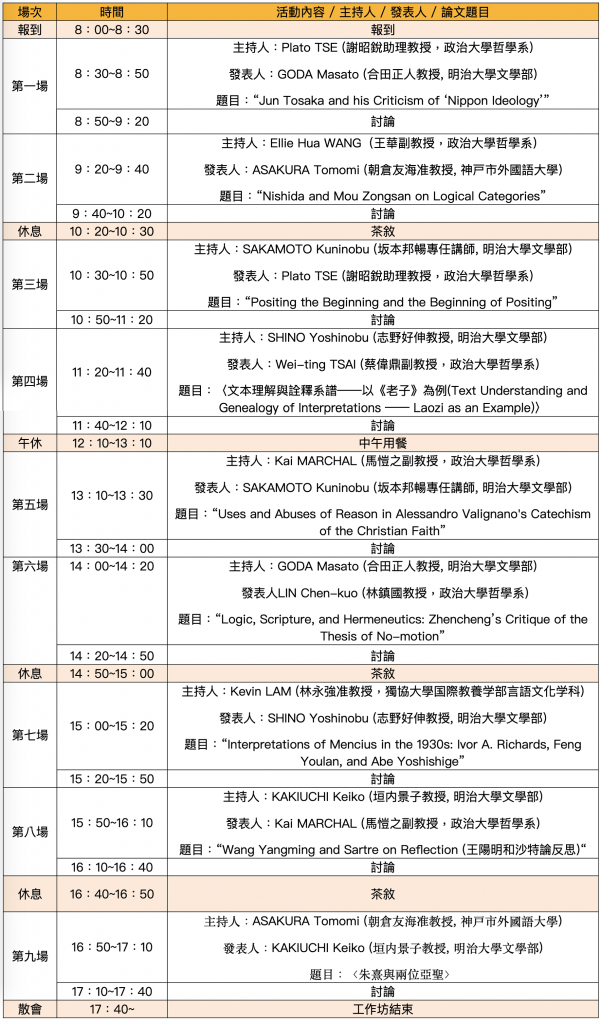
東亞視野下的邏輯工作坊
主辦單位:政大華人文化主體性研究中心
* 此活動主要以英文進行。
日期|Date
2019/4/29Mon.
時間|Time
8:30~17:408:00開始入場
地點|Place
國立政治大學法治斌講堂 綜合館院北棟13樓 271318會議室
「邏輯學」作為歐洲科學首次在東亞的出現,可追溯至1631年由李之藻和耶穌會傳教士傅汎際(Francisco Furtado)所翻譯的亞里士多德式邏輯教科書《名理探》。邏輯學在當代日本被廣泛認知為「論理学」,即「關於論辯話語之原則的科學」。在台灣,邏輯學經常被呈現為「理則學」,即「關於論證之原則的科學」;如今則是音譯為「邏輯」更為普遍。
當兩種翻譯基本上共享有亞里士多德的色彩,它們也一樣與東亞概念史上的其他意義有所同化。在德國觀念論中,邏輯在廣義上被設想是思考的法則,因此它並不僅僅被理解為形式科學,它也嵌入了意識、經驗和論述之形式。
本工作坊的宗旨,是為了從跨文化和比較視野來探索此廣義上的邏輯。我們想要檢視「邏輯學」在不同脈絡之下的種種實踐,如形上學、知識論、詮釋學、教理問答、道德哲學、意識形態批判、新儒家、道教、佛教、京都學派、基督教神學與德國觀念論。
主辦單位:國立政治大學華人文化主體性研究中心
合辦單位:國立政治大學哲學系
* 此活動主要以英文進行。
The first appearance of “Logic“ as a European science in East-Asia can be traced back to Minglitan 名理探, an Aristotelian textbook on logic translated by Li Zhizao 李之藻and the Jesuit Francisco Furtado and published in 1631. Nowadays in Japan logic is still widely conceived as ronrigaku 論理学, i.e. “science about the principles of argumentative discourse.“ In Taiwan it has often been rendered as lizexue 理則學, i.e. “science about the principles of reasoning“; in the present, the transliteration luoji 邏輯 has become very popular. While both renditions share a certain Aristotelian flavor, they have also assimilated other connotations from East-Asian conceptual history. In German Idealism logic is conceived in a broad sense as the laws of thought; it is thus understood not merely as a formal science, but as being embedded in consciousness, experience, and forms of discourse. The goal of this workshop is to explore logic in this broad sense and from a transcultural, comparative perspectives. We would like to examine the various practices of “logic” in different contexts, such as metaphysics, epistemology, hermeneutics, catechism, moral philosophy, and critique of ideology in Neo-Confucianism, Daoism, Buddhism, Kyoto School, Christian theology, and German Idealism.
發表學者|Speaker
| 講者 | 發表文章 |
| 合田正人 GODA Masato 明治大學文學部教授 | Jun Tosaka and his Critique of “Nippon Ideology” |
| 朝倉友海 ASAKURA Tomomiomomi 神戶市外國語大學準教授 | Nishida and Mou Zongsan on Logical Categories |
| 謝昭銳 TSE Platolato 政治大學哲學系助理教授 | Positing the Beginning and the Beginning of Positing |
| 蔡偉鼎 TSAI Wei tingting 政治大學哲學系副教授 | Text Understanding and Genealogy of Interpretations——Laozi as an Example |
| 坂本邦暢 SAKAMOTO Kuninobuuninobu 明治大學文學部專任講師 | Uses and Abuses of Reason in Alessandro Valignano’s Catechism of the Christian Faith |
| 林鎮國 LIN Chen kuokuo 政治大學哲學系教授 | Logic, Scripture, and Hermeneutics: Zhengcheng’s Critique of the Thesis of No-motion |
| 志野好伸 SHINO Yoshinobuoshinobu 明治大學文學部教授 | Interpretations of Mencius in the 1930s: Ivor A. Rochards. Feng Youlan, and Abe Yoshishige |
| 馬愷之 Kai MARCHALai MARCHAL 政治大學哲學系副教授 | Wang Yangming and Sartre on Reflection |
| 垣內景子 KAKIUCHI Keikoeiko 明治大學文學部教授 | School of Heart-mind and School of Exegesis: A Dialogue between Zhu Xi and Mencius |

